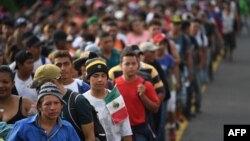To supporters of President Donald Trump’s hardline immigration policies, news of a caravan of Central American migrants heading to the U.S., just weeks before the U.S. mid-term elections, is a political gift.
“Politically speaking it’s probably going to be an election game changer, because nothing is more powerful, more potent than the idea of uncontrolled masses of people surging into your country,” said Dan Stein, president of the Federation for American Immigration Reform, a group that advocates for stricter enforcement policies to curb illegal immigration.
WATCH: Trump immigration policies
By Monday, the number of the migrants in the caravan had swelled to more than 7,000. Most are Hondurans. Many are hoping to seek asylum in the United States from the violence and poverty in their country.
Over the weekend, thousands of migrants crossed Guatemala’s border into Mexico by breaking through fences, pushing by Mexican police in riot gear and refusing offers of aid and possible asylum in Mexico.
President Trump called the migrant caravan a “national emergency" in a tweet on Monday.
In other tweets he has threatened to cut off aid to the region, and to use the U.S. military to completely shut down the border with Mexico if the caravan is not stopped. And he implied that failing to prevent what he called an “assault on our country” could undermine his support for the recently renegotiated free trade agreement with Mexico.
Election issue
Much of this rhetoric is political. The president is trying to make the migrant caravan a prominent election issue to underscore his tough immigration policies and his demand for building a wall along the U.S. Mexico border.
“The Democrats want caravans. They like the caravans,” said Trump at a political campaign rally in Nevada on Friday.
But Senate Minority Leader Chuck Schumer tweeted over the weekend that the president is just trying to change the subject away from issues he sees as losing for Republicans.
Meanwhile, immigrant rights advocates are expressing concern for the safety and security of the migrant group, which includes women and children.
“I think the caravan becomes an excuse for the president to ratchet up his rhetoric that is quite hostile and demonizing of immigrants, and gets to take away their humanity,” said Royce Bernstein Murray, with the American Immigration Council.
Despite the rhetoric surrounding the migrant caravan, the American Immigration Council says illegal immigration levels into the U.S. are not increasing. It is just that now migrant groups are made up more of families fleeing violence in countries like Honduras, which has one of the world’s highest murder rate. And they tend to travel together for safety. During a caravan in April, the numbers of migrants decreased significantly as they got closer to the U.S. border.
Unfortunate timing
There has also been speculation that caravan organizers may also be trying to gather large numbers of migrants to garner media coverage of the increasingly dangerous and impoverished situation in Central America, as well as for protection.
Sunday, U.S. Secretary of State Mike Pompeo spoke of the “apparent political motivation of some (caravan) organizers" without giving specifics.
By portraying the caravan as a looming illegal immigration onslaught, anti-immigrant activists hope to energize Republican voters who support tougher border security policies, and mitigate widespread criticism of Trump’s past policy of separating migrant families at the border.
“Trump is very successful at shifting blame, quite correctly, that the opposition to family detention to detaining minors, which created a short term public relations problem, in fact was the solution because of the deterrent value,” said Stein.
Immigrant advocates admit it is unfortunate the caravan may shift public focus away from the need to more fairly and humanely reform the immigration system and to work with Central American countries to address the root causes of poverty and violence.
“The timing is tricky no doubt, and it does play into the rhetoric of “us versus them” scenario. My hope is that it also becomes an opportunity for us to focus on this issue,” said Bernstein Murray.








